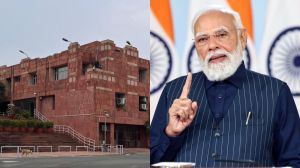Dump the old is Buddha146;s election call
The CPM-led Left Front8217;s election manifesto and the candidate list, both released this evening, give an emphatic seal of approval for s...

The CPM-led Left Front8217;s election manifesto and the candidate list, both released this evening, give an emphatic seal of approval for state Chief Minister Buddhadeb Bhattacharjee8217;s agenda for governance. The party and the front endorsed the reforms path pursued doggedly by Bhattacharjee over the past five years.
Not only does the manifesto showcase the biggest FDI projects in the state, it calls for immediate work on the modernization of Kolkata airport and the construction of a new airport.
On the political front, this is the first time that the party has dumped almost 45 of its candidates who contested the last election. Clearly, as it bids for a seventh term in power, Bhattacharjee hopes to tackle his party8217;s twin problems of anti-incumbency and urban disenchantment.
The candidate list shows that as many as 131 candidates the House has 294 seats have been denied nomination8212;64 of them are sitting MLAs of whom 62 are from the CPM. Eight Ministers8212;five of whom handle education portfolios8212;have been dropped.
When asked why this huge churn, Politburo member and Front chairman Biman Bose said: 8220;To infuse fresh blood and thereby ensure greater acceleration of the government8217;s job.8221;
That job is cut out. Affirming the changing priorities of the Left in West Bengal, the most significant pledge of the manifesto is the inclusion of the controversial Rajarhat township project in the infrastructure sector. Without naming Indonesia8217;s Salim Group, the manifesto promises to set up a Rs 40,000-crore township at Rajarhat, a highway to connect Barasat with Diamond Harbour and a new international airport.
All of these were key elements of the Salim project. This, in addition to two more township projects in Dankuni and West Howrah where, too, the Salim group is investing.
More striking is the chapter on Centre-state relations where the manifesto clearly demands that work on modernization of the Kolkata airport should be immediately taken up. Only weeks ago, comrades sang a different tune as they paralysed Kolkata airport protesting against modernization with private investment.
The need for private-public partnership has been acknowledged in several areas, particularly in health care. The manifesto also showcases the Central Rural Employment Guarantee Scheme and says the state would ensure its implementation in the districts listed.
One setback for Bhattacharjee, however, is the nomination of Ministers Subash Chakravarty Transport and Sports and Yogesh Burman Forest. Apart from controversies surrounding them, there have been several occasions when these departments have drawn flak from the Chief Minister for their poor performance. However, a senior CPIM party leader pointed out the list and the manifesto are just part of the ongoing process of 8220;reforms8221; within the party. 8220;Wait for the next big step when more sitting ministers will be denied portfolio during formation of the next Left Front government,8221; he said.
- 01
- 02
- 03
- 04
- 05































